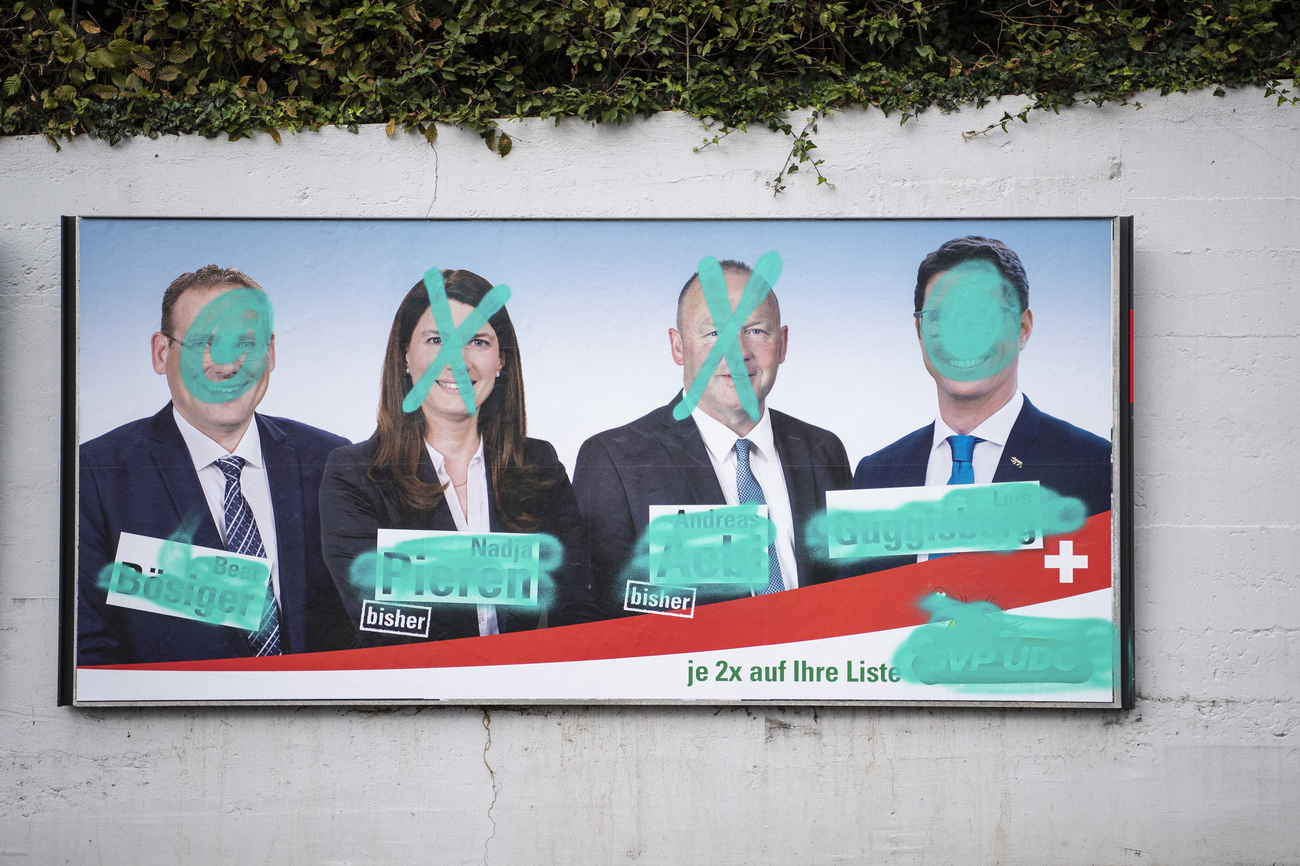Online aggression seeps into Swiss local politics, study shows

Threats and insults are far from the exception for Swiss politicians, even at the most fact-to-face local level – but physical attacks remain rare.
In Switzerland, with some 2,000 quite autonomous municipalities packed into a small country, local politics is a pillar of democracy. It’s also increasingly in need of new faces, willing to get involved without the perks and pay of professional politics.
But while it doesn’t come with the glamour of higher levels, it does come with some of the drawbacks – including threats and aggression, according to a studyExternal link published this week by the Aarau Centre for Democracy (ZDA).
From a survey of 1,000 local parliamentarians, more than a third experienced verbal insults over the past 12 months, the ZDA writes. A further 6.4% reported attacks on their belongings, and 3% were victims of physical violence. Online aggression (31%) and targeted fake news (20%) were also common. Women were more likely to be affected by insults, while physical violence was more aimed at right-wing politicians.
Want to read our weekly top stories? Subscribe here.
Given that it’s the first time such statistics have been gathered at the local level, it’s hard to tell if the violence is increasing or not. In any case, the extent is “surprising”, particularly the 36% report rate for verbal insults, says study co-author Stefan Kalberer. And even if physical aggression is rare, any violence at all is unjustifiable and worth noting, he says.
Kalberer also points to the impact of aggression. Overall, three-quarters of respondents were “satisfied” with their political roles. But for 43% of respondents who experienced some form of attack, it led them to adapt online habits – this could involve self-censorship, or scaling back social media use, the researcher says. Women were particularly likely to react in such a way. Meanwhile almost a quarter said violence affected their parliamentary work; for example, they might choose to abstain on certain votes, says Kalberer.
As for people who decide to leave politics altogether, the main reasons are more prosaic: lack of time and a perceived lack of influence. Violence was nevertheless a factor for some, mostly younger people or women.
‘Particularly nasty’
The report comes after years of striking attacks in western democracies. In Germany, local politician Walter Lübcke was shot dead by a right-wing extremist in 2019, sparking wide public debates about political violence. Since then, verbal and physical assaults on politicians in the country have more than doubled, with the Greens the most-affected party last year. In France, over 50 candidates and activists were physically attacked ahead of July’s second round of elections; in the UK, two elected MPs have been murdered in the past decade; in Slovakia and the US, Prime Minister Robert Fico and presidential candidate Donald Trump were shot this year.
Swiss media also periodically report incidents such as death threatsExternal link, milkshake attacksExternal link or property damageExternal link. Statistics from the Federal Office of Police (Fedpol) meanwhile present a more nuanced, and seemingly improving, picture. Last year, Fedpol logged 290 threats against politicians, compared to 528 in 2022.
However, last year’s drop came after three aggressive pandemic years which led to a peak of 1,215 threats in 2021. And with the tone of threats becoming “particularly nasty”, Fedpol now treats more cases as serious. Last year, a fifth of all threats warranted police action; in 2022, only around a tenth did.
Training and support
When it comes to the causes of violence, many politicians and analysts – and Fedpol – point to the impact of polarisation, especially online, which can spiral out of control. During France’s aggressive election campaign in summer, the interior minister criticised the involvement of “ultra-left, ultra-right, or other political groups”.
Many countries have thus been trying to figure out how to tackle online hate speech. The European Union’s Digital Services Act, for example, aims to force big tech firms to better police their platforms. In Germany, individuals themselves can face finesExternal link of thousands of euros for posting extreme comments. In the UK, prison sentencesExternal link have been handed down to some users who posted violent messages during the recent riots.
When it comes to tackling online violence specifically targeting local politicians, a 2022 Council of Europe reportExternal link suggested measures like training sessions on dealing with threats, harsher laws against commentors, more pro-active anti-hate speech campaigns, or – if it comes to it – police protection. Support helplines can also be useful. “Just knowing I can call helps hugely”, Swiss Social Democrat politician Meret Schindler told Tamedia newspapers last year; she was offered such a contact point with police after receiving a threatening letter.
Ultimately, it’s also important to have an overview of the extent of the problem, the Council of Europe wrote. For example, by setting up online reporting platforms, such as the pilot projectExternal link started in Zurich last year, or by running surveys like the ZDA’s this week.
Edited by Benjamin von Wyl/amva

In compliance with the JTI standards
More: SWI swissinfo.ch certified by the Journalism Trust Initiative







You can find an overview of ongoing debates with our journalists here . Please join us!
If you want to start a conversation about a topic raised in this article or want to report factual errors, email us at english@swissinfo.ch.